-
CHRISTINE (Antonio Campos 2016)
ANTONIO CAMPOS: CHRISTINE (2016)
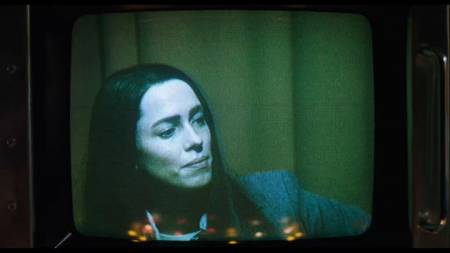
REBECCA HALL IN CHRISTINE
Too much to bear
Christine Chubbuck was a newscaster who shot and killed herself on live TV in Sarasota, Florida in 1974. By coincidence, two films about her debuted at Sundance last January. The first to be released was Kate Plays Christine, Robert Greene's study of a current-day actress preparing, with crippling thoroughness, to play the lead in a film about the event - with Kate Lyn Sheil presumably playing herself. Antonio Campos goes the direct route, with the greater success. But both films are interesting, and make quite a double bill -- to be studied in future film courses alongside Sidney Lumet's famous 1976 offshoot of Chubbuck's story Network.
Where Greene makes us think, Campos makes us feel. He plunges in and, with fullness and precision, dramatizes the original events Greene dances around. The English actress Rebecca Hall, Vicky in Allen's [URLf="http://www.chrisknipp.com/writing/viewtopic.php?f=1&t=1111]>Vicky Christina Barcelona[/URL], embodies Ms. Chubbuck and she does, from the first, a terrific job of it, the best performance of her career, backed by a superb cast and a recreation of the broadcasting and Seventies milieux with remarkable faithfulness. This is a provocative and unique movie, at once the most remarkable and most mainstream work the bold Campos has yet done. After the meta- of Greene's approach, it's part tonic, part toxic to be plunged so vividly into Chubbuck's intense, uneasy world. Campos' writer Craig Shilowich has given him a spot-on script.
Campos provides what Chubbuck's bullying TV station boss Michael (the terrific Tracy Letts) keeps calling for: juice. Do we know what led Christine to take her own life in such a dramatic way? Of course not. There are plenty of reasons. Apart the bullying, which keeps her, she thinks, from getting the opportunity to do good, serious work, she is single, dateless, a virgin, living with her mother Peg (the excellent J. Smith-Cameron) on the verge of reaching thirty. She has just learned she has an ovarian cyst whose necessary removal may make it hard to have children. She is chronically tense and socially inept, always imposing herself on people when they don't want it and withdrawing when they want to be kind and friendly to her.
All this is absurdly out of whack to the point of seeming funny sometimes; and the film revels in period, particularly the clunky accoutrements of TV on the verge of converting over from film to video when video was still pretty fuzzy and remote reports sometimes didn't play on air when called for. It's almost as if the now awkward looking styles and technology, not to mention Watergate, are themselves an unbearable burden for the sensitive, unhappy young woman -- who yet is ambitious and passionate about her work and wants so much to succeed. One of the last straws is learning that the smooth but unambitious anchorman George (Michael C. Hall) and "the little blonde number in Sports” have been tipped by the station owner for promotion to his new outlet in Baltimore, and she's been passed over. We can see very well why, and feel also that it's a shame. She's pretty and ambitious, and even the mean Michael acknowledges she's the smartest person at the station.
But probably the crisis arises not from any of this, nothing in particular, anyway. We learn that Chris got “all turned around” from something in Boston and has come to Florida for peace and quiet, but not found it. The darkness and discontent are inside. But they make what's outside understandably too much. This is one of the most restrained and convincing portraits of psychological meltdown on film. And Campos does it straight, with none of the chilly abstraction he delivered in his earlier Afterschool (starring Ezra Miller) and Simon Killer (with Brady Corbett). Campos has matured and fulfilled his promise here, ably supported by Shilowich's screenplay.
There are many admirable little touches, and the best thing is so many are neither obvious nor obligatory. There's the strange, absurd garage owner with the back room gun warehouse who loans Chris a pistol. Her little puppet shows performed as a volunteer at a children's hospital. Chris fidgeting with film and a videocamera; writing on her portable typewriter at home, composing last words on the IBM Selectric at the studio. The creepy fire victim, in shooting whom Chris has worked in "Nightcrawler" mode. Christine has lots of stuff worth coming back to.
Christine, 115 mins. debuted at Sundance Jan. 2016. Seven other festivals including Toronto, London and Mill Valley, in US theaters 14 Oct. 2016.
Last edited by Chris Knipp; 03-30-2018 at 10:08 AM.
-
SOLO/ASSOLO (Laura Morante 2016)
LAURA MORANTE: SOLO/ASSOLO (2016)
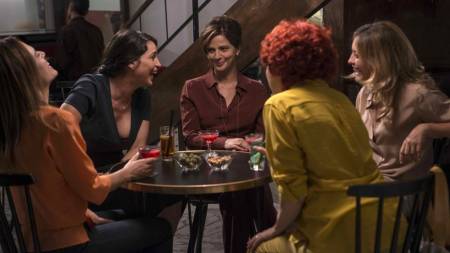
LAURA MORANTE (CENTER) IN ASSOLO
Morante looks at aging
Laura Morante's second film as a director, writer and star takes on some very serious issues. It considers the realities of growing old and being alone. But the thrust is positive: Assolo ("Solo") is an argument in favor of enjoyable solitude. Her character, Flavia, entering her fifties, has had two husbands, some lovers, two sons, and seems to be still involved with and dependent upon these men, and their current women, on a day-to-day basis. Through the course of the film, which involves much soul-searching (in voiceover) and frequent sessions with a shrink called Dr. Grünewald, Flavia comes to accept that a neighbors' mistreated dog, whom she has adopted, is perhaps all the company she really needs.
After we have seen the perfidiousness of the men in her life and the unsatisfactory nature of the new men available, we can agree with this decision. All is observed with a humane and forgiving eye in Morante's gently humorous film, which instructs, as it entertains. And yet again, despite plenty of polish and charm and the star's indestructible good looks, the result isn't wholly successful as a movie and hasn't anything truly distinctive about it. Don't et me wrong: Laura Morante, who's most remembered in this country for her performance as the mother in Nanni Moretti's beautiful and sad The Son's Room, is someone I love to watch. It just looks like I'd rather watch her being directed by someone other than herself.
Assolo is a thorough study of its protagonist's dilemmas. But therein lies the rub: explaining Flavia's circumstances takes up so much time this starts to feel like an instructional film. Though in this in many ways well-made and observant film the people in Flavia's life take hold as characters early on, it's fully two thirds of the way in before they move beyond vignettes and examples and a story starts to take hold. And as with Morante's first film as a director, [url="http://www.chrisknipp.com/writing/viewtopic.php?f=1&t=2250&view=previous"]The Cherry on the Cake[/url, Assolo has a lot of trouble establishing any kind of rhythm. This is because of a confusion of genres. The movie wavers between midlife crisis tale, wistful romantic comedy, and bourgeois satire. Some of the best moments come when Flavia's son, or his awful girlfriend, hold the screen. There is something vivid and of these times about their rude directness. But like almost everybody, except Flavia and Dr. Grünewald, they remain bit players, even though she seems only a sounding board for them.
The Cherry on the Cake was in French, and this time the French star Lambert Wilson returns the favor and appears, speaking Italian, as Flavia's sometime lover. But when he visits, it's on a business trip, and he insists on staying at a hotel because "it's more convenient." This is one of so many instances of how Flavia is slighted by the men around her. Dr. Grünewald points out that she has low self-esteem, and much of it is due to how she is being treated.
The sense of a story finally takes hold, but things are worked out only clumsily. At the end Flavia is driving out in the country in a red convertible with Kira, the little dog, at her side: victory! She has moves outside Rome and gotten a driver's license and a car. But how did she do that? We only see her failing her driving tests, repeatedly, ever more spectacularly. Is this another one of her dreams? If so, Assolo leaves things dangling. But mind you, Laura Morante has assembled a good cast and she is a wonderful-looking woman who exemplifies all that is lovely and appealing about Italian women.
Assolo {"Solo"), 97 mins., opened 5 January 2016 in Italy. It was part of the Open Roads Italian film series at Lincoln Center in June and was screened for this review as part of the Milll Valley Film Festival, October 2016.
-
DIETER BERNER: DEATH AND THE MAIDEN/EGAN SCHIELE: TOD UND MÄDCHEN (2016)
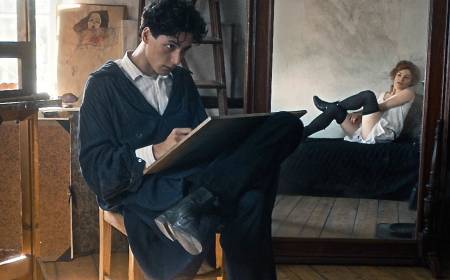
A beautiful, breezy portrait of the artist
The Egon Shiele of Dieter Berner's new film is a charmer, and the bright eyed, chiseled-featured Noah Saavedra makes that charm convincing. With his long face and windswept hair, he resembles Schiele, but is definitively prettier, and was only 24 when this film was shot. In time-honored style, the film focuses on the last days of the artist during the Spanish flu epidemic of 1918 just toward the end of the First World War, while flashing back to key moments in his adult life. He had achieved notoriety and an international reputation but was only 28. He died only three days after his wife, the bourgeois Edith (Marie Jung), for whom he'd abandoned his longtime mistress Wally (Valerie Pachner). Edith and her sister Adéle (Elisabeth Umlauft) had lived right across the street. But Wally was still around, and Edith's sister. The story the movie has to tell is of an unusual lifestyle and unique talent. Schiele was a protege of the older Gustav Klimt (Cornelius Obonya), and the two were masters of the early twentieth century Viennese style - tortured, shocking, erotic, elegant and stylish work that still looks modern. A main focus is on the artist's proclivity for painting underage women in the nude, including his 13-year-old sister Gerti (Maresi Riegner). It was essential to his convention-defying style, which involved tortured, expressionistic poses, nudity, and blatant sexuality. His always striking images make him one of the major figurative artists of the early twentieth century. It took Berner 18 months to find Saavedra for the lead role, but he shot his film in only 40 days, and it is beautiful and breezy. Here, Schiele's épater les bourgeois is not tortured but fun. Berner doesn't achieve the originality and naturalism of Maurice Pialat's Van Gogh by a long sight, but the good cheer avoids many clichés of the genre, and only the music is occasionally a little annoying.
Egon Schiele and the Death of the Maiden/Egon Schiele: Tod und Mädchen, 110 mins., debuts at the Zurich Film Festival 26 Sept. 2016, opening in Austria 7 Oct. It shows 15 Oct. at the Mill Valley Film Festival.
<Trailer.
Last edited by Chris Knipp; 02-01-2018 at 06:08 PM.
-
LAND LEGS/TEMPÊTE (Samuel Collardey 2016)
SAMUEL COLLARDEY: LAND LEGS/TEMPÊTE (2016)
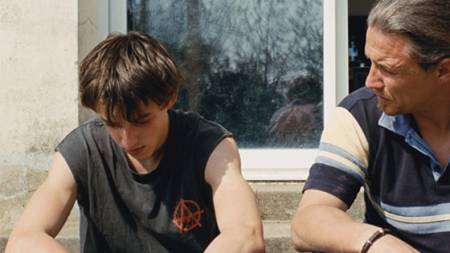
MATTEO AND DOMINIQUE LEBORNE IN LAND LEGS
Life recaptured
Samuel Collardey makes fiction-documentaries. This is a mixed genre in which real people are manipulated for the camera doing things that closely relate to their own lives. Without our knowing just how it's done, we know very well when it works. Judging by the filmmaker's debut The Apprentice/L'Apprenti (RV 2008), about a kid learning how to be a farmer, and this new one, about a deep water fisherman who must spend time on land to show up for his family, when Collardey's at the helm, it works. Without having seen the middle film of his three-film oeuvre, I'd guess Land Legs (whose French title Tempête of course means "Storm") is his most complex work in the genre yet, and an engrossing, touching film.
Dom (Dominique Leborne) is a passionate deep water fisherman who has loved fishing all his life. The director met him on an ocean voyage and fell under his spell, which is understandable. He has the gnarly good looks of the Norwegian bestseller author Karl Ove Knausgaard, and oozes charm and charisma - and a hint of sadness, which will come into play in due course. When we meet him he's at a boozy, crowded singalong at a Cork, Ireland bar. At the end of the sequence, Dom climbs atop a chair and spreads his arms, king of the feast. With its rich wide-screen 35 mm shots, the camera instantly, irresistibly captures the good feeling and warmth and draws us into the protagonist's world.
Besides the sea, Dom loves his kids, his 16-year-old adopted daughter, Mailys (Mailys Leborne), his wife's daughter by an unknown, unseen father, and his 15-year-old son Matteo (Matteo Leborne), who resembles him and shares his love of fun. Dom's times at home often begin with partying and we see a bunch of people at his house drinking and smoking joints, Matteo and Dom included. "I'm the adult here," he declares, kicking out a merrymaker, but he seems more like a big brother than a dad, though the rapport is great. He's a cool dad, and Matteo and Mailys like the freedom.
Somehow Dom manages to juggle long periods at sea with being a father. Though he and Matteo's mother are divorced, he has custody of Matteo and Mailys. Dom's mother (Chantal Leborne) fills in with the kids while he's at sea. But when Maillys gets pregnant, and the pregnancy must be terminated for medical reasons, it causes a rupture, because Dom is at sea during the crucial, traumatic event. Doubly wounded, Mailys goes to live with her mother, and a local social worker questions the status of things. Something has to change.
Dom quits his fishing job and enrolls in a four-month training course to qualify for a boat captain's license and sets about to acquire a small boat he hopes to maintain with Matteo as his first mate. But he lacks the experience or the financial resources to get the support of the fishing board or the primary loan from the bank, and he goes through a period of such penury that the cut-off heating causes Matteo also to decamp, and consider working for her new boyfriend, a mason.
The film shows how the principals weather all this in a positive way and follow Dom experiencing the realities of trying to enter a new life that doesn't really suit him.
The result is a bit of Ken Loach, a bit of the Dardennes, and a lot of Collardey. The process this time involves such adeptness in getting people to play themselves that it's almost distracting if you know they're doing that. But Collardey has successfully assembled a collection of magic moments when he caught lightning in a bottle, one lively, emotional scene after another with never a wrong note. What he did with The Apprentice was simpler, almost pure documentary, following a training period at an unspoiled country location. Here there are crowds, officials, parties, heart-to-hearts, fishing, a rough time at sea - you've got it all, above all scenes between Dom, Matteo, and Mailys that flow like magic. The Apprentice, the purer effort, did better with French critics (and it won the Prix Louis Delluc for best first film and other prizes). But this didn't fare at all badly either. Dominique Leborne won Best Actor at the debut in Venice's Orizzonti category, and the film was nominated there for Best Film.
Collardey's passion is as much visual as humanistic. At the prestigious French film school La Fémis he focused on cinematography, and he continues to shoot in 35mm and wide screen, juggling that with the speed and intimacy of catching action on the run. The screenplay was co-written by Catherine Paillé. Music composed by Vincent Girault provides background at once for the roaring sea and Dom's own tempestuous times.
Tempête/Land Legs, 89 mins., debuted at Venice 9 Sept. 2015; four other festivals. French theatrical release 24 Feb. 2016 to good reviews (AlloCiné 3.9; but The Apprentice was 4.1). Screened in connection with Mill Valley Film Festival, where it shows 11 and 13 Oct. 2016.
Last edited by Chris Knipp; 11-02-2016 at 04:11 AM.
-
THE CONFESSIONS/LE CONFESSIONI (Roberto Andò 2016)
ROBERTO ANDÒ: THE CONFESSIONS/LE CONFESSIONI (2016)
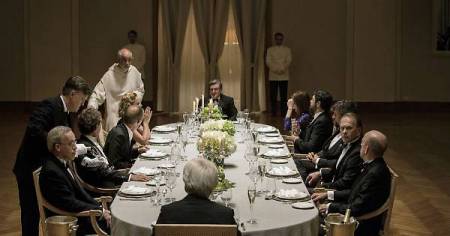
Solemn message
Sicilian-born Roberto Andò directed a film a couple years ago with Toni Servillo, Viva la libertà/Long Live Freedom. This time the protean actor dons the robes of a monk, but the theme, as before, is modern politics, or rather, this time, economics. While Long Live Freedom's plot of a politician who escapes his problems using a nutty identical twin didn't really come off, it did give Servillo an opportunity to show off his thespian skills. He should not have so much to do this time, since he's a Carthusian, and they rarely speak. (See Philip Grüning's three-hour wordless documentary Into Great Silence.) This time the point is clearer, but at the risk of being heavy-handed. For some reason the monk, who's called Roberto Salus, is invited to a gathering of the IMF for a secret G8 summit by its leader, Daniel Roché (Daniel Auteuil), who wants to confess to him. The next ting we know, after a stiff ceremony for Roché's birthday and some very choppy, irritating editing, Roché is found asphyxiated with a plastic bag over his head. The bag belonged to Salus, and the movie turns into a kind of thriller with questions about whether it was really suicide. But the real revelation is that international bankers have cold hearts, and rich people are not very good for the masses of men. If this comes as a revelation, this well crafted but stilted and humorless film will appeal to you. Saus disobeys the Carthusians' vow of silence many times over, giving way to this film's overwhelming desire to lecture us. Also starring Connie Nielsen, Marie-Josée Croze, Pierfrancesco Favino, and Lambert Wilson.
The Confessions/Le confessioni, 103 mins., opened in Italy in April 2016, and showed at Karlovy in July; scheduled for the Zurich, Vancouver, and Mill Valley film festivals in Sept. and Oct.
-
OCCUPY, TEXAS (Jeff Barry 2016)
JEFF BARRY: OCCUPY, TEXAS (2016)

LORELEI LINKLATER IN OCCUPY, TEXAS
Rebellion reconsidered
Occupy, Texas teeters on the edge between defiance and responsibility as a young man steps gingerly back into middle-class life after a long fugue into rebellion. The story was penned by the star, Gene Gallerano, who injects much wit and slyness into his role, though the movie's energy and conviction gets blunted a bit along the way.
Beau Baker (Gallerano) is a twenty-something fetched back home in Texas from New York City homelessness to shoulder mentorship of his two young sisters after their parents have died in a car crash. It seems Beau walked away from a brilliant performance in school and likely success as a lawyer seven years ago to give up chinos and polo shirts, dress hippie, and flee Texas. After some involvement in the Occupy Wall Street, he seems to have drifted into street life till rather mysteriously his Uncle Nolan (Reed Birney, VP on "House of Cards") finds him sleeping on the street and summons him back to Dallas. His parents have listed him not only as executor of the estate but legal guardian his two teenage sisters, 17-year-old Claire (Lorelei Linklater of Boyhood) and 13-year-old Arden (newcomer Catherine Elvir). His ambitious aunt Uma (Peri Gilpin) is outraged, but duties take her out of town and leave the three siblings to sort things out.
Somehow the chronology doesn't seem altogether well worked out for Beau or these events clearly placed in a context. Nonetheless for a while it is fun watching the fast-talking Beau parade around his family's posh suburban world with beard, high-concept haircut, and tattered, punkish clothes. He is defiant and irresponsible - it's hard to reconcile his childishness with either his former promise or his recent social consciousness - but he also reluctantly shoulders some of his responsibility toward the girls, though setting things up for them to take an open-ended bereavement leave from their stuffy Catholic school. Young Arden warms to Beau's ways and they bond nicely, but Claire is angry and defiant, so his job is difficult even in the moments when he shoulders it. The situation dramatizes Beau's need to assume adulthood and perhaps accept that he may be able to accomplish more good in the very world of privilege he was born into than as a tattered dissident elsewhere.
Garry and Gallerano deliver some amusing dialogue and the film is frequently good in the moment, even though the overall story arc sometimes falters. Much happens and yet not a great deal leaves a deep impression. It's not clear where things are meant to be going, perhaps because Beau's personality isn't very well defined or his transformation sufficiently delineated. He has a fling with a married woman (Janine Turner), and though his ex-girlfriend Sherry (Nikki Moore) is married and also guidance counselor at his sisters' school, she seems easily swayed to spend time with him, and the girls. Somehow there's a big party at the house where underage kids are found drinking and he's temporarily arrested and Claire is threatened with expulsion from school.
Locals attest that the filmmakers have made good use of authentic Dallas settings and landmarks, including the distinctive Lakewood Tuscan Villa used as the Baker residence around the corner from where Gallerano himself grew up, and they have assembled a very good cast all down the line. Scenes between Beau and old best buddy Kelsie (David Matranga) show what relaxed, authentic moments the film is capable of when it's not trying too hard. Gallerano is an unmistakable talent, and we look forward to more from him and director Barry.
Occupy, Texas, 93 mins., debuted at Dallas International Festival 15 April 2016, playing also at the New Jersey, Myrtle Beach and Mill Valley film festivals. It was screened as part of the latter for this review and shows there 13 and 14 Oct. 2016. Theatrical release planned for 15 Apr. 2017.
-
WHAT'S IN THE DARKNESS (Wang Yichun 2015)
WANG YICHUN: WHAT'S IN THE DARKNESS (2015)
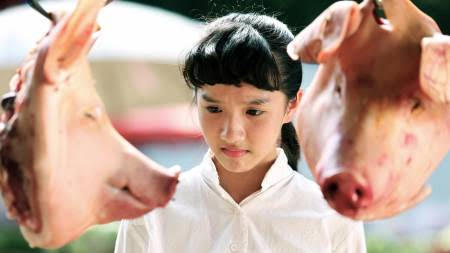
SU XIAOTONG IN WHAT'S IN THE DARKNESS
Girls in trouble
Wang Yichun's debut feature What's in the Darkness, a girl's coming-of-age story in rural northern China in the Nineties, is also, or seeks to be, as Maggie Lee wrote somewhat grandly in her Variety review, "Perhaps the most acute and uncompromisingly grim murder mystery to come out of China in years." The interweaving of the two is a considerable feat, executed with surgical precision, a sense of period, and an eye for landscape and well orchestrated little human panoramas - police in tall grass investigating a crime scene, children and young punks in a classroom, a street market. Maybe we shouldn't be too disappointed if such an ambitious mix winds up being somewhat thin on atmosphere. One longs for the passion and nostalgia of Edward Yang's A Brighter Summer Day or the dreamy stylishness of Tsai Ming-liang's Rebels of the Neon God, both incidentally from the early Nineties when Wang's story takes place. Still her intermingling of ambition and restraint is impressive if not engaging.
What unites the two story lines, in a manner that's both ironic and chilling, is sexuality. The general mood of the provincial society is a mix of prurient and repressive. Adolescent schoolgirls are discovering theirs; the murder mystery is a series of related rapes and killings of young women. The two girls in the foreground whose contrasting life paths are in view, the shy Jing (Su Xiaotong) and sensuous, rebellious Zhang Xue (Lu Qiwei), are the daughters of two of the main policemen on the case, whose methods are also in sharp contrast. The effect isn't as schematic as it sounds, because Wang's constantly shifts scenes and keeps them short, which leaves time for many small plot threads and has a cooling down effect . Maggie Lee's claim that "the performances are superbly natural across the board" fails to account for how shrill and overstated is the acting of Guo Xiao playing Qu Zhicheng, Jing's father. He's a detective who studied forensics, and he aims to be scientific and logical in tracing down the killer, while Zhang Xue's father (Zhou Kui), also a detective, just wants to put somebody away ASOP.
The mutilated and raped bodies of young women keep turning up. Meanwhile Jing is drawn into such wicked things as nail polish and a hairdresser's by Zhang Xue. Zhang Xue has a raucous boyfriend; Jing is followed by a rather sweet kid, who yet gets rounded up briefly as a sex offender. Even Jing is caught with a group about to watch a sexy movie on a videotape, when morality police come in ard round them up. Jing volunteers at a retirement center, and even there an old man puts the make on her. She comes in for continual abuse from both father and mother (Liu Dan). He sees even Jing's straddling a bike as sexual now that she's maturing. There is no warmth, no comfort anywhere, except there is the charm of Jing's enthusiastic performances of pop songs standing on a platform in a vacant lot. The boy who is keen on her she catches tape recording them, and in the nicest moment after she's forgiven him and they've become friends, he climbs up on the platform with her and they do a duo performance.
[i]What's in the Darkness/黑处有什么 [Hei chu you shen me], 100 mins., debuted at FIRST International Film Festival, also Berlin, Titanic, Singapore and Melbourne, New York Asian Film Festival at Lincoln Center (North American premiere) and also Mill Valley (15, 16 Oct. 2016), as part of which it was screened for this review.
Last edited by Chris Knipp; 12-02-2016 at 10:41 PM.
 Posting Permissions
Posting Permissions
- You may not post new threads
- You may not post replies
- You may not post attachments
- You may not edit your posts
-
Forum Rules





 Reply With Quote
Reply With Quote






Bookmarks